By any yardstick, 2024 was a tumultuous year in Irish politics, bookended by referendums in the spring and the General Election in the winter.
The political seasons also brought party leadership churn, a giveaway budget, a new Dáil and government formation machinations.
Politically speaking, there was never a dull moment.
Referendums defeated
Coming into 2024, the governing coalition was working well, with plans afoot for two referendums to be held on International Women's Day.
Ministers were confident they would win. The proposals would replace recognition of a woman's role in the home with recognition of all those who provide care, while the constitutional recognition of the family was to be expanded to include those with "durable relationships".
Government confidence the proposals would pass began to wane in the latter days of what became a divisive campaign.
When counting began on 9 March, it quickly became apparent their fears were correct.
Both proposals were comprehensively defeated by voters.
The Family referendum was defeated by 68% to 32% and the Carer proposal by an even higher margin of 74% to 26%.
The Government was left reeling by the scale of the defeat.
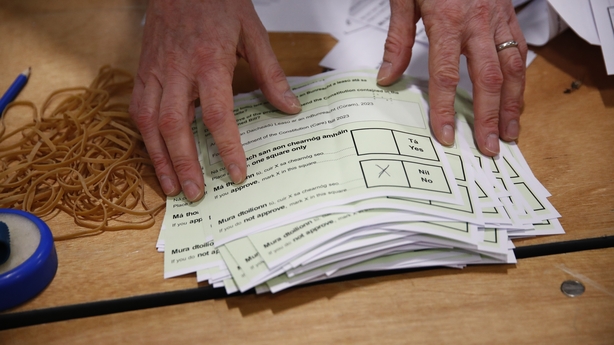
Varadkar steps down as Taoiseach, Fine Gael leader
The outcome led to pious declarations from political leaders about respecting the will of the people, but there were further ramifications for Fine Gael.
Taoiseach Leo Varadkar made the bombshell announcement he was stepping down less than two weeks later.
He did not directly reference the loss of the referendums as one of his reasons, but said after seven years in office he was no longer the right person for the job, especially as electoral contests were looming.
"Politicians are human beings. We have our limitations. We give it everything until we can't anymore, and then we have to move on," he said.
"There are loyal colleagues and good friends contesting the local and European elections and I want to give them the best chance possible.
"I think they will now have a better chance under a new leader."
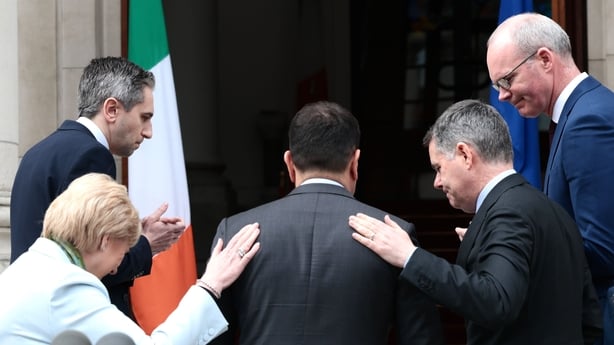
If his departure was swift, the campaign to replace him moved just as quickly.
Much speculation centred on who would seek the Fine Gael leadership, but Simon Harris had prepared for this moment.
He quickly had public endorsements from TDs Neale Richmond, Peter Burke and Patrick O'Donovan, as well as MEPs and other party members.
Other potential candidates saw their chances melting away and never even got on to the pitch.
Simon Harris, the sole candidate, became leader on 24 March.
Local and European elections
The new Fine Gael leader had little time to get his feet under the desk.
A minimal Cabinet reshuffle elevated Peter Burke and Patrick O'Donovan into senior ministerial ranks, but attention quickly turned to the local and European election campaigns.
The elections took place on 7 June with much at stake for all parties. There was an extra seat for Ireland in the European parliament bringing the total to 14, and Fianna Fáil and Fine Gael wanted to increase their MEPs as did Sinn Féin.
The Greens were seeking to hold on, as were Luke 'Ming' Flanagan, Mick Wallace and Clare Daly.
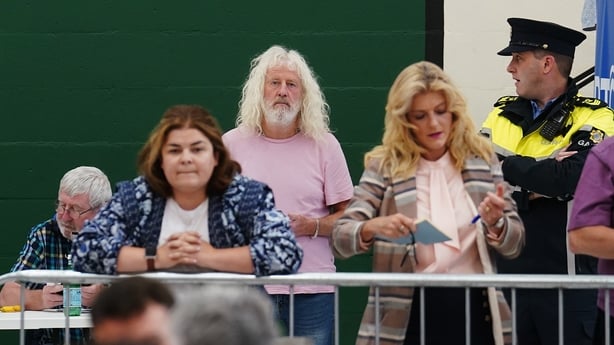
At the local level, all parties were seeking to increase their councillors.
A significant cohort of anti-immigrant candidates put themselves up for election too.
The European elections were a great success for Fianna Fáil, which increased its MEPs from two to four.
Fine Gael held its four seats, while Sinn Féin doubled their seats to two. There was churn among Independents, with only Luke 'Ming' Flanagan left standing.
Ciaran Mullooly took a seat for Independent Ireland and Michael McNamara took the other Independent seat.
Labour also made a return to the European Parliament with Aodhán Ó Ríordáin taking a seat for Dublin.
In something of a portent of things to come later in the year, the Green Party lost both its MEPs.
In the local elections the Greens also lost 26 council seats, halving their representation at local government level. Fianna Fáil and Fine Gael lost council seats but still emerged as the biggest parties.
Sinn Féin added 21 new seats to the 81 they already had, while Labour's performance was static, as the Social Democrats gained 16 councillors.
Another significant winner in the local elections was Independent Ireland, picking up 23 seats.
Others gained too, but despite immigration garnering extensive commentary in the online space and plenty of headlines too, there was no significant breakthrough for anti-immigrant candidates.
Aftermath
Despite some gain, both elections were a disappointment for Sinn Féin. The 12% they got in the locals and 11% in the Europeans fell far short of what they had expected, given they had been touching the mid-30s in opinion polls in the previous 12 months.
The Green Party were also disappointed with the results. Less than two weeks later, leader Eamon Ryan announced he was standing down and would not stand in the General Election.
He said his decision had been made months previously and not because of the election performance.
He was a giant of the Green Party, leader for 13 years, rebuilding it from outside the Dáil after its trouncing in the 2011 general election.
In early July, Roderic O'Gorman was elected leader, and Roísín Garvey as deputy leader. At that point they could not have predicted the electoral misfortune that lay ahead.
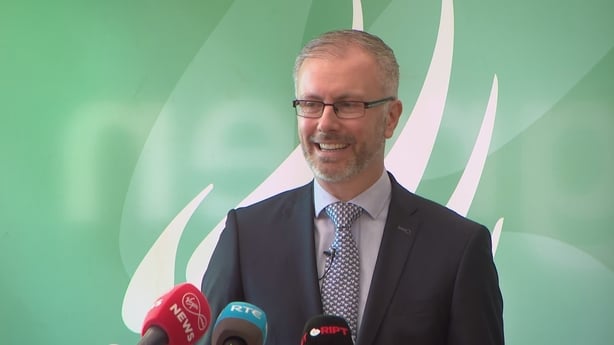
General Election speculation
Every August the political system winds down for the summer break. The Cabinet does not meet, the Dáil and Seanad are in suspension, and politicians take holidays.
This August past however, at the back of everyone's mind was the fact they were hurtling towards the end of the 33rd Dáil with a big budget to come along the way.
The new Taoiseach - abounding in "new energy" - was seen at agricultural shows up and down the country.
All party leaders and leading politicians were out and about at the National Ploughing Championships in September.
Party think-ins and meetings were dominated with policy formation and election strategy, and candidate selections were soon gaining pace.
From the beginning of the new political term, the Taoiseach, Tánaiste and Green Party leader were constantly asked about the timing of the General Election.
Questions like: What was their preference? Would they go full term? Would it be this year or next?
The stock response was that the Government still had work to complete, still a budget to deliver and important legislation to pass.
The response of Sinn Féin leader Mary Lou McDonald was: "Bring it on!"
From shelters to security huts
In September, not for the first time, the Government was left squirming as it was accused of wasting public money.
This was a constant theme whenever discussion of the new National Children's Hospital came up, but that month brought a new focal point for accusations of waste: the Leinster House bike shelter.
It was an example that was simply understood and completely indefensible.
The cost was €336,000 for a spot to park 18 bicycles.
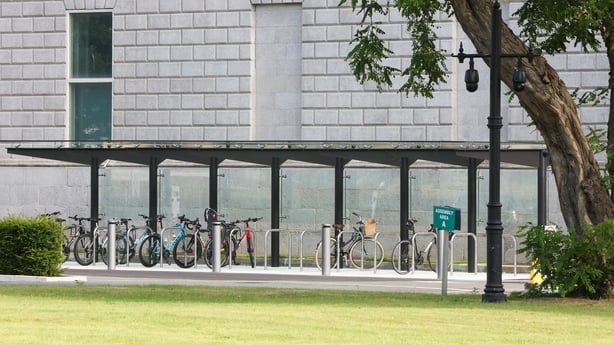
The opposition laid into the Government saying they had little regard for public money. The Government pointed the finger at the OPW.
Two weeks later the OPW revealed a security shelter at the Department of Finance cost €1.4 million to build.
That resulted in further cries from opposition politicians of all hues that the Government was financially reckless.
In 2024 the bike shed came to engender the waste of public money, and a regular theme of political and public discourse since.
Against this backdrop, speculation about the date of the General Election intensified even more.
It has been known since the summer that the budget would be brought forward by a week to 1 October.
The reason cited was to facilitate the new Minister for Finance Jack Chambers along with Minister for Public Expenditure Paschal Donohoe to attend a meeting of the EU Council of Finance Ministers.
The opposition suspected the earlier budget was all about allowing plenty time for the Finance Bill to be passed, delivering new pre-election giveaways to the public, as record levels of corporation tax continued to pour into the State's coffers.
The Budget
When October came around, Budget 2025 did just that.
Record spending was announced across the board along with changes to taxation and USC rates, increases in rent credits and welfare rates and a slew of once-off measures including pre-Christmas double welfare payments, energy credits and new baby payments.
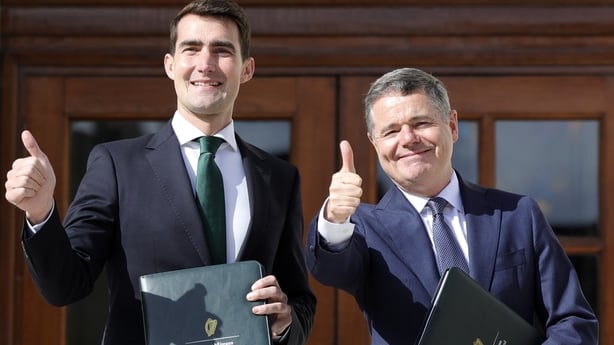
Government parties commenced a major campaign to highlight the benefits to voters, while Sinn Féin and other opposition parties decried the splurge as irresponsible and a wasted opportunity.
The opposition said that money should have been spent on badly needed infrastructure, housing and public services such as health and childcare. The independent budgetary watchdog, the Irish Fiscal Advisory Council, was also very critical.
It claimed the budget was inflationary, untargeted, overly dependent on corporation tax flows and a breach of the Government's own 5% spending increase rule.
General Election 2024
In the final weeks leading into the dissolution of the Dáil, election speculation reached fever pitch.
There was still no indication if it would be in November or next February. Public interest was ramping up slowly, but politicians up and down the country were assiduously working their constituencies.
For their part, the coalition leaders remained non-committal and referenced the legislative programme that needed to be completed before any election could take place.
But as the Finance Bill, the Planning Bill, the Gambling Bill and others completed their legislative journey, the tide could no longer be held back.
In late October, Roderic O'Gorman said the 29 November was "the date to go".
On the first Wednesday of November, Tánaiste Micheál Martin said on Virgin Media News the election would be called two days later.
That evening, Taoiseach Simon Harris went on RTÉ's Six One News to say he would travel to Áras an Uachtaráin on Friday and ask the President to dissolve the 33rd Dáil and fix 29 November as polling day.
In the end, Fianna Fáil came out on top in the General Election.
They took 48 seats, followed by Sinn Féin on 39.
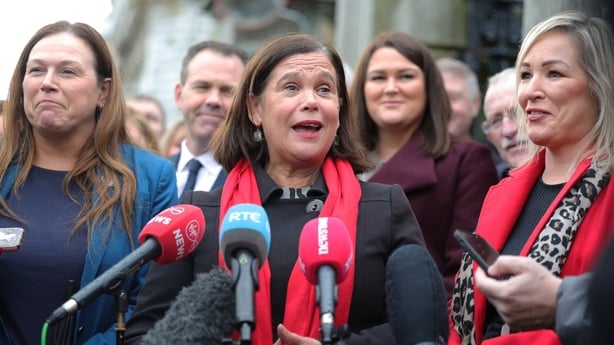
After a campaign that was at times challenging for Fine Gael and new leader Simon Harris, they ended up on 38 seats.
Government formation
The die was cast for the return to power of the two main coalition parties, but who will be their new partners in power?
Topping off a very bad electoral year, the Green Party lost 11 of its 12 seats while Labour and the Social Democrats both increased seats to 11 apiece.
Others saw seat gains and seat losses, but it is the Regional Independents who are now shaping up to be the third leg of the new coalition stool.
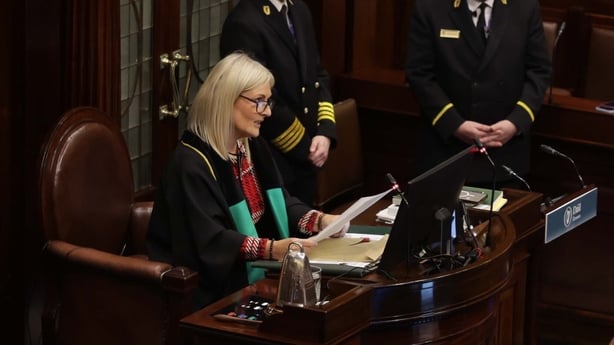
Talks have been in suspension over the Christmas period, but will recommence with gusto in the coming days.
When the Dáil resumes again on 22 January, under the watchful eye of the Regional Independents' choice for Ceann Comhairle, Verona Murphy, expect Micheál Martin to be elected taoiseach once again.
The new government must then go back to dealing with old problems.
Armed with a fresh mandate and a five-year term that will take it as far as November 2029, the unsolved problems of housing, health, climate and infrastructure await.







